Appliedsciencebysarah
On this page, you find all documents, package deals, and flashcards offered by seller AppliedsciencebySarah.
- 11
- 0
- 2
Community
- Followers
- Following
13 Reviews received
14 items
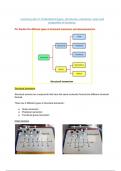
BTEC applied science: unit 14 Learning aim C: Understand types, structures, reactions, uses and properties of isomers.
BTEC applied science: unit 14 Learning aim C: Understand types, structures, reactions, uses and properties of isomers. Grade dictinction contains: P4: Explain the different types of structural isomerism and stereoisomerism M4: Compare the different types of isomers and their industrial importance. D3: Analyse the chemical / therapeutic importance of isomerism
- Package deal
- Essay
- • 12 pages •
BTEC applied science: unit 14 Learning aim C: Understand types, structures, reactions, uses and properties of isomers. Grade dictinction contains: P4: Explain the different types of structural isomerism and stereoisomerism M4: Compare the different types of isomers and their industrial importance. D3: Analyse the chemical / therapeutic importance of isomerism
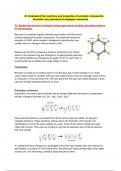
BTEC Applied Science: Unit 14 learning aim B
BTEC applied science: unit 14 learning aim B: Understand the reactions and properties of aromatic compounds. Distinction grade title: Aromatic ring chemistry for designer chemicals contains: B.P2 Explain the structure of benzene using sigma and pi bonding, providing evidence for the structure. B.P3 Explain the chemical properties of industrially important benzene and monosubstituted benzene compounds. B.M3 Compare the mechanisms for addition and substitution reactions of benzene. B.D...
- Package deal
- Essay
- • 21 pages •
BTEC applied science: unit 14 learning aim B: Understand the reactions and properties of aromatic compounds. Distinction grade title: Aromatic ring chemistry for designer chemicals contains: B.P2 Explain the structure of benzene using sigma and pi bonding, providing evidence for the structure. B.P3 Explain the chemical properties of industrially important benzene and monosubstituted benzene compounds. B.M3 Compare the mechanisms for addition and substitution reactions of benzene. B.D...
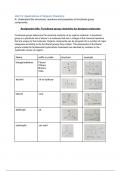
BTEC Applied Science: Unit 14 learning aim A
assignment A unit 14, distinction grade. which contains: A. D1 Analyse the types of reaction mechanisms undergone by non-carbonyl and carbonyl compounds. A.M1 Construct mechanisms for non-carbonyl and carbonyl compounds. A. M2 Plan a multi-step synthesis of carbonyl and non-carbonyl organic molecules in order to produce many organic substances, taking more than one reaction step. A. P1 Explain the reactions of a range of carbonyl and non-carbonyl functional group
- Package deal
- Essay
- • 48 pages •
assignment A unit 14, distinction grade. which contains: A. D1 Analyse the types of reaction mechanisms undergone by non-carbonyl and carbonyl compounds. A.M1 Construct mechanisms for non-carbonyl and carbonyl compounds. A. M2 Plan a multi-step synthesis of carbonyl and non-carbonyl organic molecules in order to produce many organic substances, taking more than one reaction step. A. P1 Explain the reactions of a range of carbonyl and non-carbonyl functional group

Unit 2 - Assignments: A,B,C and D
All assignments for unit 2 marked and achieved grade of Distinction. Contains: - Learning aim A - Learning aim B - Learning aim C - Learning aim D
- Package deal
- • 4 items •
All assignments for unit 2 marked and achieved grade of Distinction. Contains: - Learning aim A - Learning aim B - Learning aim C - Learning aim D

Unit 2- Learning aim A: Practical Scientific Procedures and Techniques
Unit 2 Learning Aim A: undertake titration and calorimetry to determine concentration of solutions. Contains: P1: Correctly prepare and standardise a solution for titration or colorimetry P2: Investigate the concentration of an unknown solution, using procedures and techniques in titration or colorimetry: M1: Demonstrate skillful application of procedures and techniques in titration or colorimetry to accurately determine the concentration solution D1: Evaluate the accuracy of proce...
- Package deal
- Essay
- • 14 pages •
Unit 2 Learning Aim A: undertake titration and calorimetry to determine concentration of solutions. Contains: P1: Correctly prepare and standardise a solution for titration or colorimetry P2: Investigate the concentration of an unknown solution, using procedures and techniques in titration or colorimetry: M1: Demonstrate skillful application of procedures and techniques in titration or colorimetry to accurately determine the concentration solution D1: Evaluate the accuracy of proce...
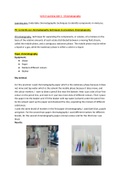
Unit 2 - Learning aim C: Chromatography
Unit 2 - Learning aim C: Chromatography Contains: P5: Correctly use chromatography techniques to procedure chromatograms. P6: Explain the use of chromatographic techniques to separate mixtures M3 - Analyse own chromatograms + relate factors that affect separation of mixtures to quality of results obtained D3 - Evaluate chromatographic techniques used in relation to outcomes + suggest improvements D3 - Evaluate chromatographic techniques used in relation to outcomes + sugge...
- Package deal
- Essay
- • 12 pages •
Unit 2 - Learning aim C: Chromatography Contains: P5: Correctly use chromatography techniques to procedure chromatograms. P6: Explain the use of chromatographic techniques to separate mixtures M3 - Analyse own chromatograms + relate factors that affect separation of mixtures to quality of results obtained D3 - Evaluate chromatographic techniques used in relation to outcomes + suggest improvements D3 - Evaluate chromatographic techniques used in relation to outcomes + sugge...
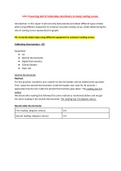
Unit 2- Learning aim B: Practical Scientific Procedures and Techniques
Btec applied science Unit 2- Learning aim B: Practical Scientific Procedures and Techniques Contains: P3: Correctly obtain data using different equipment to construct cooling curves. P4: Correctly determine the rate of cooling substances using cooling curves. M2: Analyse the rate of cooling of substances from your data using cooling curves to draw valid conclusions D2: Evaluate the accuracy of practical work in calorimetry relation to the analysis of the cooling curve. Feel ...
- Package deal
- Essay
- • 14 pages •
Btec applied science Unit 2- Learning aim B: Practical Scientific Procedures and Techniques Contains: P3: Correctly obtain data using different equipment to construct cooling curves. P4: Correctly determine the rate of cooling substances using cooling curves. M2: Analyse the rate of cooling of substances from your data using cooling curves to draw valid conclusions D2: Evaluate the accuracy of practical work in calorimetry relation to the analysis of the cooling curve. Feel ...
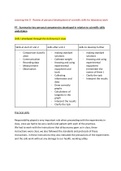
Unit 2- Learning aim D: Practical Scientific Procedures and Techniques
Unit 2- Learning aim D: Practical Scientific Procedures and Techniques All criteria achieved with a grade of distinction. Contains: P7 - Summarise key personal competencies developed in relation to scientific skills undertaken M4 - Analyse skills developed and suggest improvements to practise D4 - Evaluate scientific skills developed in terms of potential for future progression Please if you have any questions feel free to send a message:) (Don't copy and paste use as a ...
- Package deal
- Essay
- • 8 pages •
Unit 2- Learning aim D: Practical Scientific Procedures and Techniques All criteria achieved with a grade of distinction. Contains: P7 - Summarise key personal competencies developed in relation to scientific skills undertaken M4 - Analyse skills developed and suggest improvements to practise D4 - Evaluate scientific skills developed in terms of potential for future progression Please if you have any questions feel free to send a message:) (Don't copy and paste use as a ...
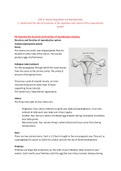
Unit 9: Human Regulation and Reproduction - Learning aims A,B and C
Unit 9: Human Regulation and Reproduction A: Understand the interrelationship and nervous control of the cardiovascular and respiratory systems. B: Understand the homeostatic mechanisms used by the human body C: Understand the role of hormones in the regulation and control of the reproductive system
- Package deal
- • 3 items •
Unit 9: Human Regulation and Reproduction A: Understand the interrelationship and nervous control of the cardiovascular and respiratory systems. B: Understand the homeostatic mechanisms used by the human body C: Understand the role of hormones in the regulation and control of the reproductive system

BTEC Applied Science: Unit 8 Learning aim B (Lymphatic system).
Unit 9 - Learning aim C
BTEC Applied Science: Unit 14 learning aim B
BTEC Applied Science: Unit 14 learning aim B
BTEC Applied Science: Unit 8 Learning aim B (Lymphatic system).